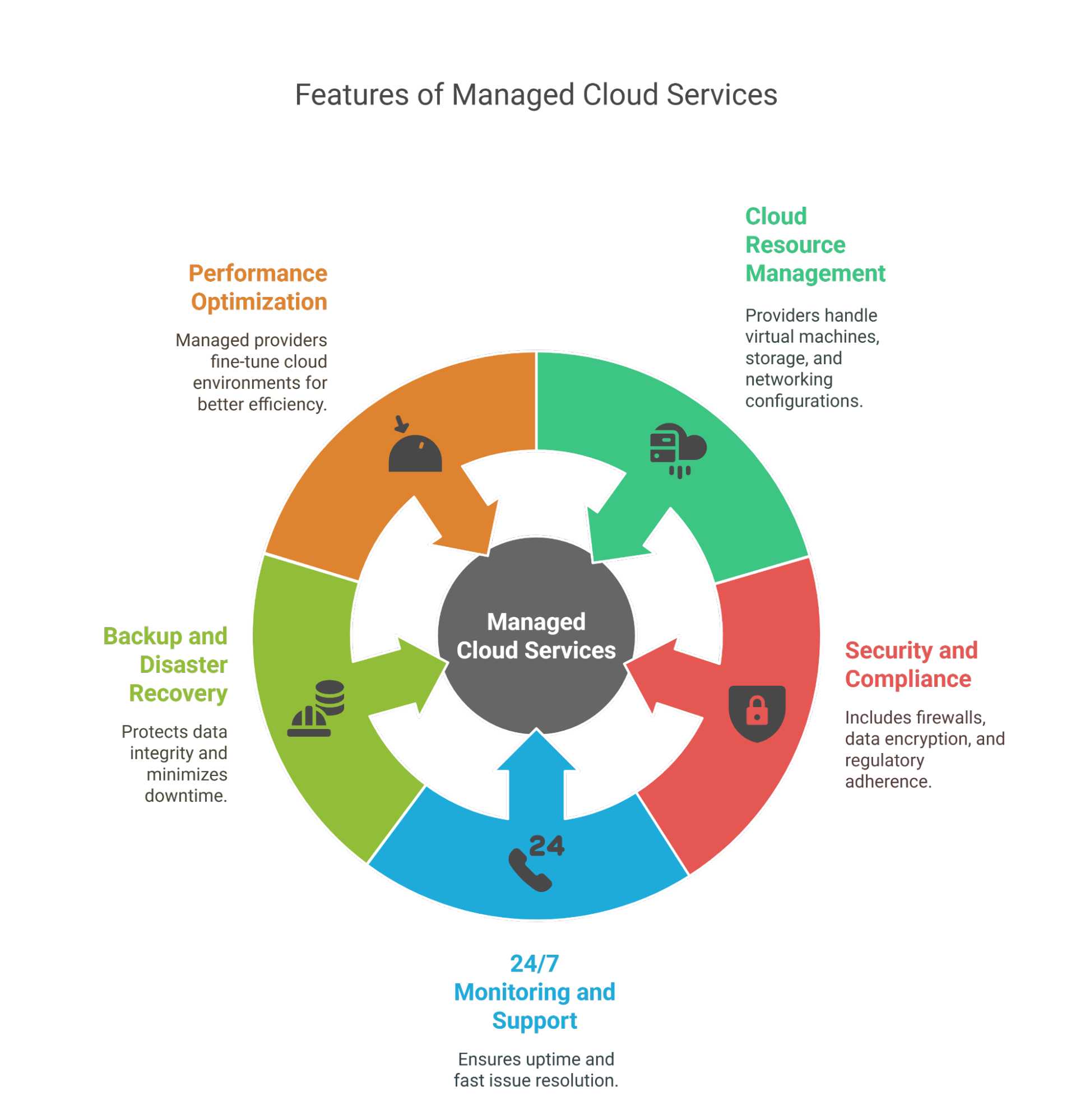Cloud computing has revolutionized how businesses deploy, manage, and scale their digital infrastructure. Many companies turn to managed cloud services to handle the complexities of cloud operations, ensuring security and performance without the need for extensive in-house expertise.
But while managed cloud services offer convenience, they are not the right fit for every business.
| As Tim Timrawi, CEO of Sharktech says, “Managed cloud solutions offer amazing convenience and simplicity, but that’s not what every organization needs. Some prefer self-managed cloud hosting, which provides greater control, flexibility, and cost efficiency.” |
In this guide, we’ll explore what managed cloud services are, their benefits and limitations, and why some businesses opt for self-managed cloud hosting instead.
What Are Managed Cloud Services?
Managed cloud services refer to the outsourcing of cloud infrastructure and IT management to a third-party provider. Instead of businesses handling cloud configurations, monitoring, security, and maintenance themselves, a managed service provider (MSP) takes care of these responsibilities.
How Managed Cloud Services Work
A managed cloud service provider oversees a company’s cloud environment, ensuring it operates smoothly and efficiently. This includes provisioning cloud resources, updating software, monitoring security threats, and providing disaster recovery solutions.
Essentially, businesses pay for expertise and convenience, allowing their internal teams to focus on core operations rather than IT infrastructure.
Common Features of Managed Cloud Services
- Cloud resource management – Providers handle virtual machines, storage, and networking configurations.
- Security – Includes firewalls, data encryption, and regulatory adherence (e.g., HIPAA, GDPR).
- 24/7 monitoring and support – Ensures uptime and fast issue resolution.
- Backup and disaster recovery – Protects data integrity and minimizes downtime.
- Performance optimization – Managed providers fine-tune cloud environments for better efficiency.
While managed cloud services can be highly beneficial, they are not a one-size-fits-all solution. Some businesses may find that these services introduce trade-offs that limit control and increase costs.
Benefits of Managed Cloud Services
Managed cloud services provide a structured and simplified approach to cloud management, particularly for companies that lack dedicated IT resources. Here are some of the key benefits.
Reduced IT Burden
Businesses that rely on managed cloud services can operate without needing an in-house IT team to handle infrastructure tasks. The provider takes care of system maintenance, updates, and troubleshooting, freeing internal teams to focus on strategic projects.
Enhanced Security
With cybersecurity threats on the rise, managed cloud services offer built-in security features such as continuous monitoring, threat detection, and automated patch management. For organizations in regulated industries, this may allow them to better adhere to necessary standards like PCI-DSS, HIPAA, and GDPR.
Scalability and Reliability
Managed cloud services provide dynamic resource allocation, allowing businesses to increase or decrease computing power and storage as needed. This flexibility enables organizations to handle workload fluctuations without the need for manual intervention.
However, reliability depends on the provider’s managed cloud platform design, redundancy measures, and ability to meet service-level agreements (SLAs).
While most managed providers offer high uptime guarantees and failover mechanisms, businesses that require customized redundancy configurations may prefer self-managed cloud hosting to control reliability at a granular level.
Predictable Costs and Resource Optimization
SME’s spent 47% of their total technology budget on cloud costs, which increased to over 50% in 2023. Many managed cloud services operate on a pay-as-you-go or subscription-based model, which can help businesses forecast IT costs more accurately. Providers also optimize cloud usage to prevent resource wastage, reducing unnecessary expenses.
Drawbacks of Managed Cloud Services
While managed cloud computing services offer convenience, they also introduce certain limitations that businesses should consider before committing to them.
Loss of Control
One of the biggest trade-offs with managed cloud services is the reduced ability to configure and customize cloud environments. Businesses relying on a managed provider may face restrictions on software configurations, security policies, or resource allocations.
Higher Costs Compared to Self-Managed Solutions
Managed cloud services come at a premium, as businesses pay not only for managed cloud infrastructure, but also for the provider’s expertise and support. For organizations with in-house IT teams, self-managing cloud environments can be significantly more cost-effective.
Vendor Lock-In
When businesses rely on a specific managed service provider, switching to another provider—or moving back to a self-managed model—can be costly and complex. Many managed providers use proprietary tools or configurations, making transitions more difficult.
What Is Self-Managed Cloud Hosting?
Self-managed cloud hosting is a cloud infrastructure model where businesses maintain full control over their servers, applications, security settings, and resource configurations. Unlike managed cloud services, which outsource cloud management to a provider, self-managed cloud hosting allows businesses to configure and operate their cloud environments independently.
How Self-Managed Cloud Hosting Works
With self-managed cloud hosting, businesses lease cloud resources from a provider but are responsible for:
- Installing and configuring applications.
- Managing security settings and updates.
- Monitoring system performance and troubleshooting issues.
- Implementing backup and disaster recovery plans.
This model is ideal for businesses with technical expertise, offering cloud services to clients, or having dedicated IT teams that prefer complete autonomy over their cloud infrastructure.
Why Some Businesses Prefer Self-Managed Cloud Applications Over Managed Cloud Services
While managed cloud services provide convenience, many businesses choose self-managed hosting for greater control, cost savings, and flexibility.
Full Control Over Infrastructure & Software
With self-managed hosting, businesses are not restricted by provider-imposed limitations. They can configure their servers, optimize performance settings, and deploy applications exactly as needed.
Lower Costs for Businesses With IT Expertise
For organizations with internal IT teams, self-managed cloud hosting eliminates the need to pay for managed services. Businesses can allocate resources efficiently without paying for management overhead.
No Vendor Lock-In, With Greater Flexibility
Managed cloud services often tie businesses to a specific provider’s tools and infrastructure. With self-managed hosting, companies can migrate workloads freely and customize their cloud environment without contractual constraints.
Performance Optimization for High-Demand Applications
Businesses with resource-intensive workloads—such as AI models or large-scale data processing—can fine-tune performance settings to maximize efficiency. Self-managed cloud hosting allows for granular control over resource allocation and optimization.
| Want more cloud computing insights? Read these next:
|
Choosing the Right Cloud Solution for Your Business
Managed cloud services offer a structured, hassle-free approach to cloud management, making them ideal for businesses that need security and scalability without in-house IT expertise.
However, they come with trade-offs, including higher costs, limited control, and potential vendor lock-in. For organizations that want full control, flexibility, and cost efficiency, self-managed cloud hosting is a compelling alternative.
The Sharktech Cloud provides high-performance, self-managed cloud hosting solutions that empower businesses to configure and optimize their cloud environments as they see fit—without unnecessary management fees or restrictions.
Backed by over 1,000 clients, a 99.999% uptime guarantee, and 24/7 human-led support, it’s the ideal choice for businesses that demand flexibility, security, and uninterrupted performance.
It’s time to explore the freedom and flexibility of the Sharktech Cloud. Request a free consultation with Sharktech today.





More to Read
The OpenStack Public Cloud Complexity Problem (And Why It’s Costing You)
Choosing the right cloud platform today is akin to trying to pick a needle
Oct
Make Growth and Security Part of Your Public Cloud Management Strategy
Managing today’s cloud infrastructure is no longer just about spinning up servers or
Sep
Leading Cloud Service Providers Explained: Types, Benefits, and How to Choose
94% of businesses now use a cloud solution in some form. Whether it’s
Aug
What is Public Cloud? A Simple Guide For Businesses
What is public cloud? It’s a model of cloud computing where infrastructure and
Jul
What is Cloud Migration? A Practical Guide for Modern Businesses
What is cloud migration? It’s the process of moving digital assets—like data, applications,
Jul
Why Some Businesses Choose Self-Managed Cloud Instead
Cloud computing has revolutionized how businesses deploy, manage, and scale their digital infrastructure.
Apr